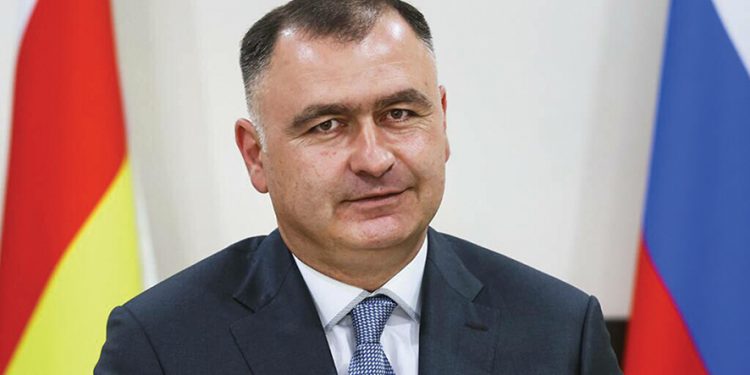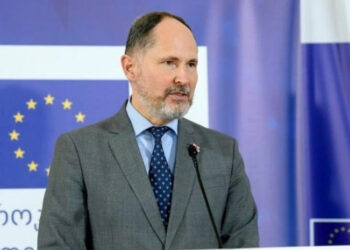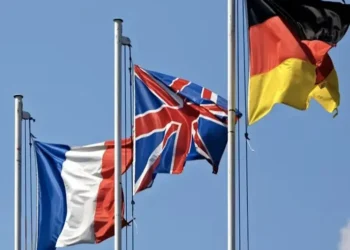In May 2022, as a result of the illegitimate presidential elections in the occupied Tskhinvali region, Alan Gagloyev was elected as the new de facto president. Gagloyev has devoted the first year of his “presidency” to the fight against his predecessor, and we are set for a repeat this year. This article summarizes the first year of Gagloyev’s “presidency.”
His Coming to “Power”
Alan Gagloyev, the leader of the Nykhas Political Party and a former security officer, defeated the incumbent de facto President, Anatoly Bibilov, in the second round of the illegitimate elections. On April 10, 2022, in the first round, Gagloyev received 36.9% of the vote and Bibilov – 33.5%. In the second round, which was held on May 8, Gagloyev secured 56.09% of the vote while Bibilov received 40.90%. Gagloyev’s victory was largely ensured by protest voters unifying under the opposition wing.
Bibilov’s failure was influenced by several important events, which undermined his political reputation in the local community. The first is the “Jabiev case,” a black spot in Bibilov’s tenure. In August 2020, Jabiev, who was arrested for allegedly attempting to assassinate the then de facto Minister of Internal Affairs of the Tskhinvali region, Igor Naniev, died as a result of violence by law enforcement officials. Jabiev’s death incited a long protest from the local population and a political crisis.
Bibilov’s reputation was also damaged by the so-called Chorchana-Tsnelisi crisis, which was caused by the deployment of a Georgian police checkpoint near the occupation line in August 2019. Bibilov was often accused of corruption – according to his opponents, Russian-allocated funds were not properly spent.
Factors that contributed to Bibilov’s defeat may well become a challenge for Gagloyev. If he is unable to deal with such challenges in a timely manner, the defeated Bibilov will use Gagloyev’s mistakes for political revenge. As such, this year may be a critical one for Gagloyev.
The Gagloyev-Bibilov Fight
The first year of Gagloyev’s rule took place against the background of both direct and indirect conflict between him and Bibilov. In this regard, several main issues can be highlighted, namely:
Referendum Cancellation
The first thing Gagloyev did was to cancel the referendum on the unification of “South Ossetia” with Russia. The referendum was part of Bibilov’s pre-election campaign, one which the Kremlin did not support. Moscow welcomed Gagloyev’s decision and accused Bibilov of using the referendum issue for political gain. Bibilov was defeated in this battle, and it became clear that the referendum was not in the interests of the Kremlin at this stage.
The Jabiev Case
According to locals, the culprits in this case have yet to be punished and the case is being delayed, which may raise suspicions against Gagloyev that he, like Bibilov, does not intend to punish the perpetrators. Gagloyev also understands the risks here, and that is why the “General Prosecutor’s Office” resumed the investigation in October 2022 and completed the preliminary investigation in March 2023. After electing Gagloyev as “president,” all those militiamen who were connected with Jabiev’s case were arrested. A criminal case was initiated against the former de facto Minister of Internal Affairs, Igor Naniev (who Jabiev was accused of attempting to assault), for exceeding his official powers. To insure himself, Gagloyev said that “the case is ready to be submitted to the court, however, the suspects are delaying this because they cannot timely familiarize themselves with the case materials.” Gagloyev faces a dilemma here, as, while the locals demand execution of the law, the punishment of the Jabiev case suspects, in this interconnected society where everyone is a relative or friend, is guaranteed to upset the other side.
The Donbas Front
Bibilov has also opened a front against Gagloyev in the Russian-occupied Donbas, where he spends most of his time and broadcasts propaganda videos dressed in military uniform. Bibilov wants to show that Gagloyev does not sufficiently support Russia’s military aggression and that he refrains from openly backing Moscow’s policy. As a counterweight to Bibilov, Gagloyev periodically turns up in Donbas or sends humanitarian aid. Nevertheless, Bibilov has the advantage of being on the front line.
The Chorchana-Tsnelisi Crisis
On February 2, 2023, Gagloyev visited a section of the occupation line near the village of Tsnelisi and congratulated the “border guards” on their professional day. The so-called Chorchana-Tsnelisi crisis is connected with Bibilov’s name, seeing him blamed that, due to his weakness, the Georgian side opened a police checkpoint in the vicinity of Tsnelisi, thus posing danger to the Ossetian population. Gagloyev’s visit and periodic statements on this issue should be considered in the context of his political struggle with Bibilov, the purpose of which is to present Bibilov as a political leader during whose “presidency” Tskhinvali ceded “Ossetian lands.”
Corruption
After electing Gagloev as “president,” projects implemented during Bibilov’s tenure were thoroughly studied. The so-called General Prosecutor’s Office initiated a case against the heads of several “state-owned enterprises,” who are accused of exceeding their official power or for unjustified expenditure of funds. Improper spending of Russian money was one of the reasons for dissatisfaction with Bibilov in Moscow.
Gagloyev also receives Russian funding. The “budget” of the region is practically fully financed by Russia. Under the 2023-2025 investment program, Tskhinvali will receive an additional RUB 3.5 billion. If Gagloyev wants to gain the Kremlin’s trust, which will serve him well in the domestic political struggle, he must prove to Russian officials that he can spend Russian money better than Bibilov.
“Government” Formation
It took too long for Gagloyev to form a new de facto government, which can be explained by the scarcity of personnel resources and the pre-election commitments made to the opposition groups. It also took him a while to change the “ministers” of Bibilov’s time. Gagloyev even managed to appoint and dismiss some of them. The biggest change during Gagloyev’s almost one-year term of “presidency” came in April 2023, when he appointed a new “deputy prime minister,” “ministers” of internal affairs, education, finance and construction, and a “Mayor” of Tskhinvali.
The changes were preceded by an inspection by the Russian Federal Treasury of the Tskhinvali region, which prepared a total of 87 notes, the largest number of which refers to the payment of salaries to those employees who work in several agencies. It is an established practice in the region that people are employed in several public agencies simultaneously so as to earn a higher salary. These gave Bibilov the opportunity to employ his political supporters. The Kremlin demands the elimination of such practices.
Long-Awaited Meeting with Putin
Gagloyev was unable to secure a meeting with Russian President Vladimir Putin for a long time, for which his opponents criticized him. Gagloyev’s visits to Moscow were limited to meetings with Russian officials (Deputy Chief of Staff of the Russian President, Dmitry Kozak, Deputy Secretary of the Security Council, Rashid Nurgaliev), who supervise the occupied regions of Georgia, which raised suspicion that the Kremlin was not taking him seriously. The long-awaited meeting was finally held. Gagloyev was supposed to meet with Putin on February 22, 2023, however, reportedly, the de facto president was Covid positive and the meeting was instead held on March 16. Although no new or important decisions were reached during the meeting, the (albeit delayed) audience with Putin was still a big relief for Gagloyev, as it will give him a certain advantage in the internal political struggle in the de facto republic.
What Has Changed in Relations with the Georgian Side?
In the first year of Gagloyev’s “presidency,” compared to the previous years, small positive changes were observed in relations with the Georgian side, which is mostly manifested in the restoration and relative simplification of movement along the occupation line.
Restoration and Simplification of Movement
Gagloyev gave a pre-election promise to ethnic Georgian residents of the occupied Akhalgori municipality to open the so-called border with the rest of Georgia, which had been closed since the “Chorchana-Tsnelisi” crisis. In this regard, Gagloyev fulfilled his promise and, as per an August 18, 2022 decision of the de facto Security Council, the population of the occupied Akhalgori and Java districts were allowed to move to the territory controlled by the Georgian authorities through the so-called crossing checkpoints of Odzisi-Mosabruni and Perevi-Kardzmani from the 20th to 30th each month. Since August of last year, the movement has been going smoothly, and about 2,500-3,000 people enjoy this right every month.
In addition, as per a decision of April 2023, obtaining “passes” to cross the so-called border will be eased. As a result, it will be possible to submit an application to cross the “border” in the Java and Akhalgori “administrations.” Previously, the mentioned application was only submissible at the so-called State Security Committee of the de facto republic. Residents of the Ksani Gorge and Sinaguri-Kardzmani zone will also be allowed to obtain passes to cross the occupation line in the Akhalgori and Java administrations.
While crossing the occupation line, residents of the Akhalgori and Java districts can carry hand luggage without restrictions, including products which are subject to sanctions in Russia. The decision also made it easier for the population of the de facto republic to receive various social and health services available on the territory controlled by the central government of Georgia.
The opening of the so-called crossing checkpoints, in addition to being Gagloev’s pre-election promise, may also be Moscow’s decision; in so doing, showing its “appreciation” of the position of the central government of Georgia in refusing the imposition of sanctions against Russia and opening of a “second front.” Gagloyev’s refusal to hold a referendum may be viewed in the same context. These two issues may be a message from Moscow to the central government of Georgia that the Kremlin “appreciates” the official position of Tbilisi on the issue of the Russian military aggression in Ukraine.
Mearakishvili’s Case
A criminal prosecution against Tamar Mearakishvili, a civil activist living in occupied Akhalgori, was terminated. The so-called Prosecutor’s Office of Tskhinvali closed the case due to the absence of corpus delicti in the act. The case was initiated on August 16, 2017. Mearakishvili was a sharp critic of the de facto government, especially of Bibilov, and her “legal” prosecution was aimed at intimidating and silencing her.
Ergneti Meetings
During Gagloyev’s tenure, the Incident Prevention and Response Mechanism (IPRM) meetings in Ergneti continued without interruption. Despite the fact that during the meetings the parties make complaints to each other, a positive agenda has emerged of late: The parties agreed on cooperation during the irrigation season.
The Challenge Gagloyev Will Face
This year, Gagloyev’s main challenge will be the illegitimate parliamentary elections scheduled for 2024. Political groups have already started preparation for the elections. In recent months, several new political parties have been established and slow political regrouping is evolving. Bibilov is preparing for revenge, hoping that military success in Donbas and Gagloyev’s mistakes will aid him in returning as the main political force in the occupied region.
By Mamuka Komakhia, Analyst, for GFSIS














